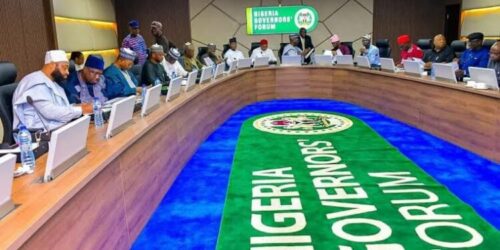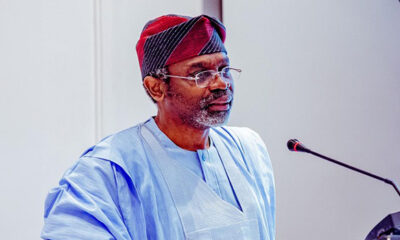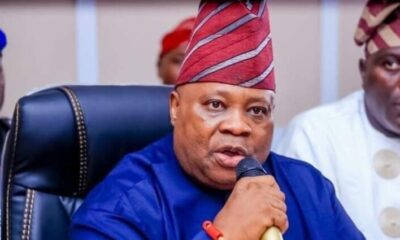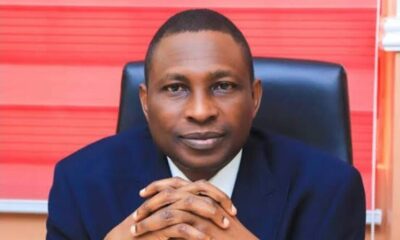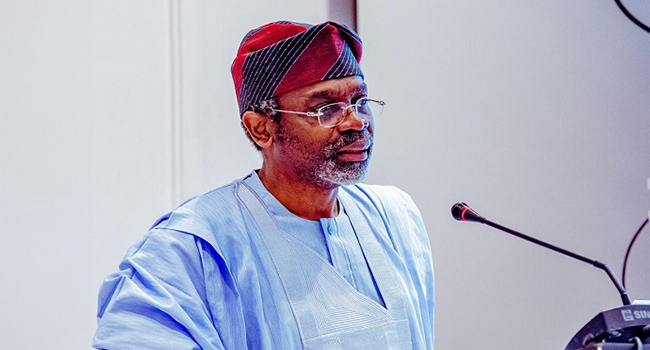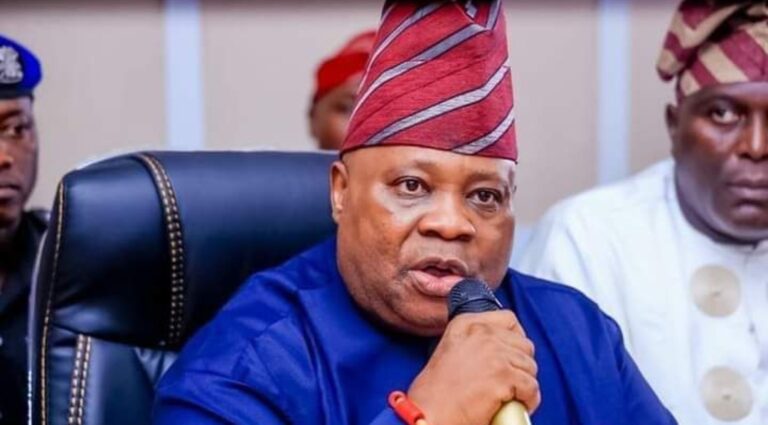The burden of enforcing the minimum wage could bankrupt numerous states as the country waits for the new rate that President Bola Tinubu has promised to send to the National Assembly.
During its meeting on Tuesday, the Federal Executive Council decided to withdraw a memo regarding the tripartite committee’s report on the new minimum wage. This was done to facilitate further discussions between the federal and state governments, the private sector, and labour unions.
Vice President Kashim Shettima chaired the National Economic Council meeting last Thursday, where Tinubu met with the governors. While the meeting was expected to discuss the national minimum wage, it remained silent on the matter.
The communiqué from the Southern Governors’ Forum, which met in Abeokuta, Ogun State, was also made public last Thursday. In it, the governors requested that each state negotiate a minimum wage with its labour force.
However, the Nigeria Governors’ Forum’s position regarding their excessive influence on the minimum wage negotiations has prompted a response from the labour unions.
In a document, titled, “Analysis of State FAAC inflows and state expenditure profile,” of the Nigeria Governors’ Forum Secretariat, the NGF report warned that implementing the new minimum wage could push states into bankruptcy due to increased recurrent expenditure.
According to the report, the burden of recurrent expenditure already left Abia, Ekiti, Gombe, Imo, Katsina, Kogi, Oyo, Plateau, Sokoto, Yobe, and Zamfara in deficit in 2022.
The report predicted that if the recurrent expenditure increased by 50 per cent, 13 states would fall into deficit, with only 10 remaining financially stable.
The tripartite committee’s recommendation of a N62,000 minimum wage would necessitate over a 100 per cent increase from the current N30,000, potentially leaving only a few states like Anambra, Bayelsa, Borno, Ebonyi, Gombe, Imo, Jigawa, Kaduna, Lagos, and Rivers with positive net revenues, based on the 2022 fiscal data.
A net revenue is the deduction of recurrent expenditure from the total revenue of the state. When it is positive, it means a surplus, but when negative, there is a deficit.
Also, the total revenue of states is calculated from the monthly revenue from the Federal Account Allocation Committee, internally generated revenue, aid and grants, and constituency development funds.
According to the documents, with an employment size of about 58,631 workers, it pays N5,837,899,980.40 as a monthly wage. Anambra has a population of 20,541 and pays N1,824,851,308.96 monthly as wages, apart from N894,480,399.62 as pension obligations and N579,694,680.33 for debt servicing.
Bayelsa boasts a 48,213 workforce, paying N5,802,435,178.58 monthly, with N1,194,528,784.40 as pension obligation and N3,535,787,992.48 as debt servicing, totaling N10,532,751,955.46 as total recurrent expenditure monthly.
Benue has about 13,366 workers in its workforce and pays N2,040,184,471.85 as monthly wage, N76,838,634.62 for pension, and N64,685,126,826.08 for debt servicing, totaling N66,802,149,932.56 monthly.
Delta has about 50,871 workers, offering N8,973,081,853.50 as wages, N1,499,886,303.39 as pension, and N72,417,433,139.00 as debt servicing, accumulating to N82,890,401,295.89 in a month.
Jigawa has about 44,831 workers in its employ and pays N2,795,662,113.02 as wages and N345,987,843.12 as a pension, totaling N3,141,649,956.14 monthly on recurrent expenditure.
Katsina, Kwara, and Niger have 19,062, 36,048, and 22,225 workers, with accumulated N139,294,944,565.27, N4,457,268,675.54, and N2,653,614,213.35 monthly recurrent expenditures, respectively.
According to the document, Abia has a total recurrent expenditure of N111,983,979,958.62, against a total revenue of N147,637,730,867.73.
For Adamawa, the recurrent expenditure stands at N70,369,399,885.57, against a total revenue of N109,722,949,684.65, while Akwa Ibom boasts a high revenue of N444,288,683,000, with a recurrent expenditure of N235,144,539,000.
Of the states, Lagos has the highest total revenue, amassing N1,243,778,878,170 in 2022, with a recurrent expenditure of N621,043,036,000, followed by Delta, with N702,020,717,460.08 and a recurrent expenditure of N377,905,100,451.83.
Rivers amassed N525,588,159,714.88 in 2022, with recurrent expenditure of N186,974,715,774.87; Kaduna had a total revenue of N222,349,875,000 and expenditure of N95,987,999,472.10; Ogun, N297,249,009,626.83, recurrent expenditure of N178,519,010,628.42; and Oyo, with total revenue of N247,156,776,739.70 and recurrent expenditure of N152,077,804,384.65.
Kebbi State had the lowest total revenue in 2022, raking in N92,132,444,588.16 and spending N57,601,464,374.96 on recurrent expenditure, followed by Taraba, with a total revenue of N101,177,283,069.87 and recurrent expenditure of N75,055,201,412.62.
Aside from FAAC allocation, some states recorded poor IGR in the 2022 data compiled by the NGF Secretariat.
Zamfara State generated N6,513,960,477.20, followed by Kebbi with N8,630,767,122.96, Taraba with N9,744,331,840.01, and Yobe State with N9,940,554,642.00.
The IGR of Katsina (N12,821,119,042.64), Adamawa (N13,175,774,969.53), Niger (N14,427,373,136.00), Benue (N15,021,223,729.38), Plateau (N15,927,001,739.90), and Imo (N16,711,346,111.18) also showed poor revenue standing.
The Punch reported on October 19, 2023, that 15 states have yet to implement the N30,000 minimum wage for their workers since it was signed into law in 2019.
According to BudgiT, though the 15 states were yet to implement the minimum wage of N30,000, the 36 states of the federation grew their cumulative personnel cost by 13.44 percent to N1.75 trillion in 2022 from N1.54 trillion in 2021.
The civil society organisation, in a release, ‘The States of States Report 2023,’ highlighted that the 36 states of the federation grew their revenue by 28.95 percent from N5.12 trillion in 2021 to N6.6 trillion in 2022.
“Put together, the IGR of the 36 states appreciated by 12.98 percent from N1.61 trillion in 2021 to N1.82 trillion in 2022, denoting a strengthened domestic revenue mobilisation capability.
“Nonetheless, the IGR to GDP ratio remained very low at 1.01 percent. The increase in IGR did not reflect across the board, as 17 states experienced a decline in their IGR from the previous year, while 19 states recorded positive growth,” BudgIT said.
The Assistant General Secretary of the NLC, Chris Onyeka, claimed in an interview with the News Agency of Nigeria on minimum wage and its implementation that many state governors were flouting the Minimum Wage Act and listed the states of Abia, Enugu, Bayelsa, Delta, Nasarawa, Gombe, Adamawa, Niger, Sokoto, Imo, Anambra, Taraba, Benue, and Zamfara as defaulting.
Reacting, the Enugu State chairman of TUC, Ben Asogwa, said the state commenced payment of the N30,000 minimum wage and its consequential adjustment in February 2020 for state government workers, while local government workers and primary school teachers were paid a 25 percent consequential adjustment.
He, however, said Governor Peter Mbah, on assumption of office, approved the full implementation of the N30,000 minimum wage for both LG workers and primary school teachers in the state.
The Punch reports that the Zamfara State Governor, Dauda Lawal, announced during a meeting with the leadership of the labour unions that the state would begin payment of the N30,000 minimum wage effective June 2024.

 BIG STORY5 days ago
BIG STORY5 days ago
 BIG STORY2 days ago
BIG STORY2 days ago
 BIG STORY2 days ago
BIG STORY2 days ago
 BIG STORY5 days ago
BIG STORY5 days ago
 BIG STORY4 days ago
BIG STORY4 days ago
 BIG STORY3 days ago
BIG STORY3 days ago
 BIG STORY4 days ago
BIG STORY4 days ago
 BIG STORY2 days ago
BIG STORY2 days ago




